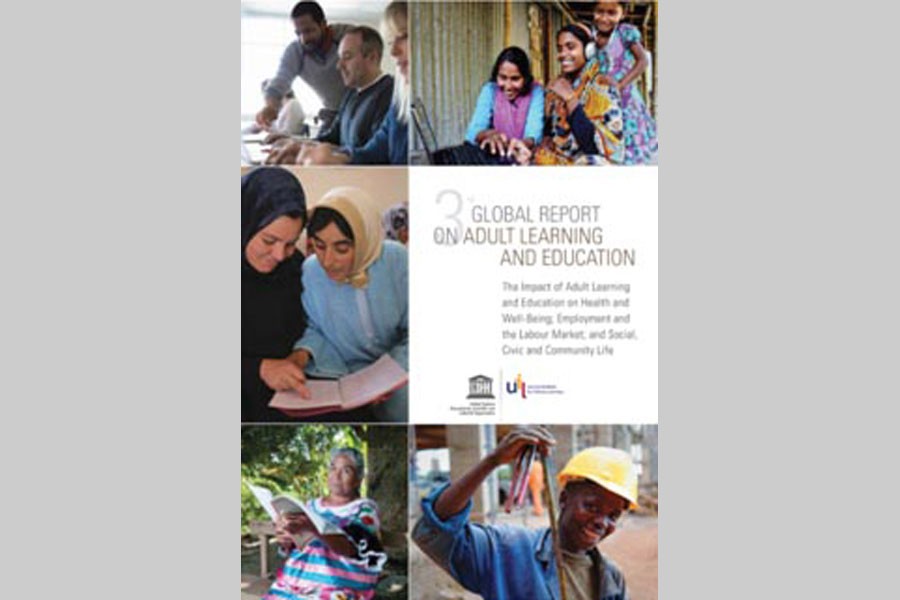
Published :
Updated :

"All people, irrespective of sex, age, race, ethnicity, and persons with disabilities, migrants, indigenous peoples, children and youth, especially those in vulnerable situations, should have access to lifelong learning opportunities that help them acquire the knowledge and skills needed to exploit opportunities and to participate fully in society." - (United Nations, 2015, Paragraph 25)
Education is vital for human rights and dignity, and is a vehicle for sustainable development. Educating adults also has powerful impacts on families and on children's education, influencing economic development, health and civic engagement across society. Today the world of adult learning and education is responding to major processes of transformation. Rapid technological advances are demanding that citizens of all ages develop new skills while also providing an unprecedented range of opportunities to learn. Longer life expectancy now in many countries is presenting healthcare and social systems with a new set of challenges, but is also enabling younger people to benefit from the knowledge and experience of older generations. Countries all over the world have long recognised that adult learning and education (ALE) has an important role to play in promoting social inclusion, citizen engagement, healthcare and sustainable economic growth.
The third Global Report on Adult Learning and Education reasserts the importance of ALE both as a value itself and as a valuable tool in addressing today's challenges. It seeks to remind readers that education helps both individuals and societies achieve their goals. This well-documented publication evaluates countries' progress in fulfilling the commitments they made in the Belém Framework for Action, which was adopted at the Sixth International Conference on Adult Education (CONFINTEA VI) in 2009. In addition, the report examines the impact of ALE on three major areas: i) health and well-being; ii) employment and the labour market; and iii) social, civic and community life. It provides policymakers, researchers and practitioners with convincing evidence for the wider benefits of ALE across all these areas. It also highlights some of the major contributions that ALE can make to realising the 2030 Agenda for Sustainable Development Goals (SDGs).
The report contains six chapters. The introductory chapter provides general insights into how ALE contributes to broader economic and social outcomes. It reflects on how the impact of ALE can be measured and better understood. It also provides a brief history of the Global Reports on Adult Learning and Education (GRALE) series and shows how this report builds on its predecessors, which were published in 2009 and 2013. The report is then divided into three main parts. Part-1 monitors how well the countries are doing in fulfilling their commitments under each of the five areas of the Belem Framework for Action. Findings indicate that there are still about 758 million adults, including 115 million people aged between 15 and 24, who cannot read or write a simple sentence. Most countries have missed the Education for All target of achieving a 50 per cent improvement in levels of adult literacy by 2015. Achieving proficiency in literacy and basic skills for adults remains a top priority in the great majority of countries, irrespective of income status. Part-1 also identifies ways in which ALE could be better monitored in future years.
The second part comprises three thematic chapters exploring the benefits ALE can bring in three important domains: health and well-being (Chapter 2); employment and the labour market (Chapter 3); and social, civic and community life (Chapter 4). Each chapter reviews the latest evidence, relevant literature and interesting case studies from around the world. By using the GRALE III monitoring survey as a starting point, these chapters also explore the extent to which countries recognise the value of ALE and act upon this recognition in each of the three domains. The chapters confirm the benefits of ALE and provide persuasive arguments for investing in ALE in the future. Part-3 of the report offers guidance for the road ahead. It consists of two chapters. Chapter 5 presents lessons and discusses the implications for ALE of major global trends like migration, ageing populations, changes in the nature of employment, growing inequality and environmental degradation. Chapter 6 examines how ALE has been recognised in the 2030 Agenda for Sustainable Development, identifying the goals, targets and indicators that are of greatest relevance to ALE. It considers how the 2030 Agenda for Sustainable Development might pave the way for greater inter-sectoral collaboration on ALE and for a better balance of educational opportunities across all ages. It also sheds light on the availability of data to measure the progress on ALE, and reflects on how the knowledge gaps might be closed.
The report concludes with an invitation to readers to join the global ALE community, and to use Global Reports on Adult Learning and Education (GRALE) as a platform for debate and action. All partners, especially policymakers, are encouraged to review the findings and implement necessary changes in their policies and practices in regional, national and local contexts. GRALE III underlines three overarching policy implications. Firstly, countries need to remember that adult learning and education (ALE) is an indispensable component of education, and that education is a fundamental and enabling human right. Secondly, they need to see adult learning and education (ALE) as an integral dimension of a balanced life course. Finally, they need to view adult learning and education (ALE) as part of a holistic, inter-sectoral sustainable development agenda with the potential to offer multiple benefits and long-term impact.
The writer is an independent researcher.
smrayhanulislam@hotmail.com


 For all latest news, follow The Financial Express Google News channel.
For all latest news, follow The Financial Express Google News channel.